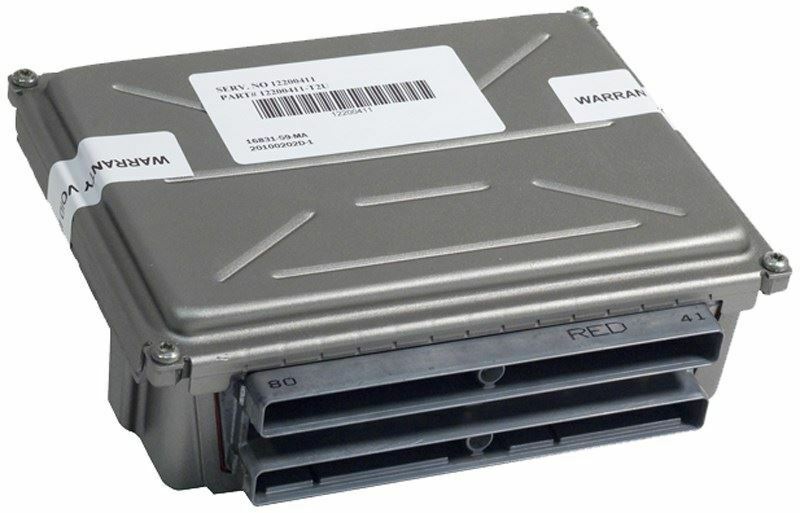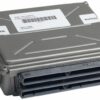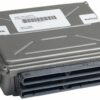Is Your GM Vehicle Running Rough? The PCM Might Be the Culprit.
If your 2004 Cadillac CTS, 2003 Chevy Silverado, or other compatible GM vehicle is suffering from mysterious and frustrating issues like poor fuel economy, erratic shifting, a persistent Check Engine Light, or even a no-start condition, the problem may lie deep within its electronic core: the Powertrain Control Module (PCM). As the central computer for your engine and transmission, a failing PCM can cause a cascade of problems that are often misdiagnosed, leading to costly and unnecessary repairs of other components.
This is a direct replacement Powertrain Control Module, service number 12576106, designed to restore your vehicle’s factory performance and reliability. The most significant advantage we offer is that we program the module specifically for your vehicle using your VIN before it ships. This means it arrives at your door with the latest GM software updates, ready for a straightforward installation. You get to skip the expensive trip to the dealership for programming, saving you both time and money.
Diagnosing a Faulty 2004 CTS Powertrain Control Module
A failing PCM can manifest in numerous ways, often mimicking the symptoms of other faulty parts like sensors or coils. Understanding these signs is the first step toward a correct diagnosis and a lasting repair. If your vehicle is experiencing any of the issues below, it’s time to consider the health of its main computer.
From the Diagnostic Bay
We had a 2003 GMC Sierra 2500 with the 8.1L engine come into the shop. The owner had already replaced the throttle body, mass airflow sensor, and all eight spark plugs chasing an intermittent stalling issue and a P0606 (PCM Processor Fault) code. The truck would run fine for days, then suddenly die at a stoplight. After verifying the power and ground circuits to the PCM were solid, we knew the internal processor was failing intermittently. We installed one of our pre-programmed modules, performed the security relearn, and the truck has been running without a single hiccup for over a year. It saved the owner from throwing more parts at a problem that was computer-related from the start.
Common Symptoms of PCM Failure
- ✔ Persistent Check Engine Light (CEL) with various or no specific codes.
- ✔ Engine stalling, stumbling, or misfiring for no apparent reason.
- ✔ Noticeable decrease in fuel efficiency.
- ✔ Harsh or erratic automatic transmission shifting.
- ✔ The engine cranks but refuses to start.
- ✔ Communication errors with diagnostic scan tools.
- ✔ Failure to pass state emissions testing.
The Plug-and-Play Solution
Our process is designed to be as simple as possible for both DIY mechanics and professional technicians. When you purchase this module, you provide us with your vehicle’s 17-digit VIN. Our technicians then use official GM equipment to load the correct software and calibrations for your exact vehicle configuration. This ensures all systems, from the engine and transmission to the anti-lock brakes and security system, communicate correctly. The module you receive is a true plug-and-play component, engineered to get you back on the road quickly.
This unit is a direct replacement for multiple service numbers, including: 12581565, 12570557, 12570558, 12576106, 12576869, 12578127, 88864822, and 89017733. It fits a wide range of GM trucks, vans, and cars from the 2003-2004 model years, such as the Corvette, Express/Savana vans, S10/Blazer, and heavy-duty Silverado/Sierra pickups with the 8.1L engine. Please verify the part number and check the fitment list to ensure compatibility.
Frequently Asked Questions
What is a Powertrain Control Module (PCM)?
The PCM is your vehicle’s main computer, responsible for managing the engine’s fuel injection, ignition timing, emissions systems, and the transmission’s shift points. It takes data from dozens of sensors to make real-time adjustments for optimal performance, efficiency, and low emissions.
Why does this module need to be programmed?
Every vehicle has a unique configuration based on its engine, transmission, emissions equipment, and other options. Programming the PCM with your specific Vehicle Identification Number (VIN) ensures it has the correct software and calibrations to operate your vehicle as the manufacturer intended. An unprogrammed module will not work correctly, if at all.
Is this part difficult to install?
For most vehicles, the physical installation is straightforward. It typically involves disconnecting the battery, unplugging the electrical connectors from the old module, unbolting it, and then reversing the process with the new one. The location varies, but it’s often in the engine bay (e.g., under the battery tray or on the fender).
Will I need to do anything after installing the new PCM?
In most cases, you will need to perform a security relearn procedure, also known as a Passlock or anti-theft relearn. This procedure syncs the new PCM with your vehicle’s anti-theft system and keys. It’s a simple process that typically takes 30 minutes and does not require special tools. We can provide instructions for this procedure upon request.
How do I provide my VIN?
After you complete your purchase, please send us a message with your 17-digit VIN. You can find your VIN on your vehicle’s dashboard (visible through the windshield), on the driver’s side door jamb sticker, or on your vehicle’s registration and insurance documents.


